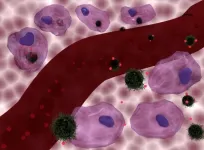(Press-News.org) Repeated intravenous (IV) ketamine infusions significantly reduce symptom severity in individuals with chronic post-traumatic stress disorder (PTSD) and the improvement is rapid and maintained for several weeks afterwards, according to a study conducted by researchers from the Icahn School of Medicine at Mount Sinai. The study, published September XX in the American Journal of Psychiatry, is the first randomized, controlled trial of repeated ketamine administration for chronic PTSD and suggests this may be a promising treatment for PTSD patients.
"Our findings provide insight into the treatment efficacy of repeated ketamine administration for PTSD, an important next step in our quest to develop novel pharmacologic interventions for this chronic and disabling disorder, as a large number of individuals are not sufficiently helped by currently available treatments," says Adriana Feder, MD, Associate Professor of Psychiatry at the Icahn School of Medicine at Mount Sinai and lead author of the study. "The data suggests repeated IV ketamine is a promising treatment for people who suffer from PTSD and provides evidentiary support to warrant future studies to determine how we can maintain this rapid and robust response over time."
Previous to the current study, Mount Sinai researchers conducted the first proof-of-concept, randomized, controlled trial of a single dose of intravenous ketamine for PTSD, which showed significant and rapid PTSD symptom reduction 24-hours post-infusion. First approved by the U.S. Food and Drug Administration as an anesthetic agent in 1970, ketamine acts as an antagonist of the N-methyl-d-aspartate (NDMA) receptor, an ionotropic glutamate receptor in the brain. In contrast, widely used antidepressants target different neurotransmitters - serotonin, norepinephrine, and dopamine - and can take weeks to even months to work. These drugs are considered ineffective in at least one third of cases, and only partially effective in an additional third.
"The data presented in our current study not only replicates, but also builds on our initial findings about ketamine for PTSD, indicating that in addition to being rapid, ketamine's effect can be maintained over several weeks. PTSD is an extremely debilitating condition and we are pleased that our discovery may lead to a treatment option for so many who are in need of relief from their suffering," said Dennis S. Charney, MD, Anne and Joel Ehrenkranz Dean of the Icahn School of Medicine at Mount Sinai and President of Academic Affairs for the Mount Sinai Health System and senior author of the paper.
For the current study, participants were randomly assigned to receive six infusions of ketamine, administered three times per week over two consecutive weeks, compared to six infusions of the psychoactive placebo control midazolam (chosen because its pharmacokinetic parameters and nonspecific behavioral effects are similar to those of ketamine) administered and evaluated over the same schedule. Individuals in this study had severe and chronic PTSD from civilian or military trauma, with median duration of 14 years and nearly half of the sample taking concomitant psychotropic medications. The primary traumas reported by participants included sexual assault of molestation, physical assault or abuse, witnessing violent assault or death, having survived or responded to the 9/11 attacks, and combat exposure. All study participants were assessed at baseline, at week 1 and week 2, as well as on each infusion day by teams of trained study raters who administered the Clinician Administered PTSD Scale for DSM-5 and the Montgomery-Asberg Depression Rating Scale (MADRS), standard rating scales for the assessment of PTSD and depression.
Significantly more participants in the ketamine group (67 percent) attained at least 30 percent or more reduction in symptoms from baseline at week two than those in the midazolam group (20 percent). Furthermore, ketamine infusions were associated with marked improvements across three of the four PTSD symptom clusters - intrusions, avoidance, and negative alterations in cognitions and mood. In the subsample of ketamine responders, improvement in PTSD symptoms was rapid, observed 24 hours after the first infusion, and was maintained for a median of 27.5 days following the primary outcome assessment day. In addition to PTSD symptom improvement, the ketamine group exhibited markedly greater reduction in comorbid depressive symptoms than the midazolam group, which is notable given the high comorbidity of depression in individuals with PTSD. Study findings further suggested that repeated ketamine infusions are safe and generally well-tolerated in individuals with chronic PTSD.
"Future studies may include administering additional doses over time and examining repeated ketamine infusions combined with trauma-focused psychotherapy, to help us determine how we can maintain this robust response over the long term," added Dr. Feder. "We want people suffering with PTSD to know that hope is on the horizon and we are working diligently to collect the information that will help bring them the relief they so desperately need."
Drs. Charney and Feder are named co-inventors on an issued patent in the United States, and several issued patents outside the U.S., filed by the Icahn School of Medicine at Mount Sinai for the use of ketamine as a therapy for PTSD.
This work was funded by a NARSAD Independent Investigator Award from the Brain & Behavior Research Foundation (PI Dr. Feder), by a generous donation from Mr. Gerald Greenwald and Mrs. Glenda Greenwald, and by Mount Sinai Innovation Partners through the i3 Accelerator, a $10 million fund providing nascent Mount Sinai discoveries with the investment necessary to fast-track technology development to reach patients sooner. Additional funding for this study was provided by the Ehrenkranz Laboratory for Human Resilience, a component of the Depression and Anxiety Center for Discovery and Treatment at ISMMS.
INFORMATION:
About the Mount Sinai Health System
The Mount Sinai Health System is New York City's largest academic medical system, encompassing eight hospitals, a leading medical school, and a vast network of ambulatory practices throughout the greater New York region. Mount Sinai is a national and international source of unrivaled education, translational research and discovery, and collaborative clinical leadership ensuring that we deliver the highest quality care--from prevention to treatment of the most serious and complex human diseases. The Health System includes more than 7,200 physicians and features a robust and continually expanding network of multispecialty services, including more than 400 ambulatory practice locations throughout the five boroughs of New York City, Westchester, and Long Island. The Mount Sinai Hospital is ranked No. 14 on U.S. News & World Report's "Honor Roll" of the Top 20 Best Hospitals in the country and the Icahn School of Medicine as one of the Top 20 Best Medical Schools in country. Mount Sinai Health System hospitals are consistently ranked regionally by specialty by U.S. News & World Report.
For more information, visit https://www.mountsinai.org or find Mount Sinai on Facebook, Twitter and YouTube.
As the world grows increasingly globalized, one of the ways that countries have come to rely on one another is through a more intricate and interconnected food supply chain. Food produced in one country is often consumed in another country -- with technological advances allowing food to be shipped between countries that are increasingly distant from one another.
This interconnectedness has its benefits. For instance, if the United States imports food from multiple countries and one of those countries abruptly stops exporting food to the United States, there are still other countries that can be relied on ...
SAN ANTONIO and CHICAGO - An article published Jan. 5 in Alzheimer's & Dementia: The Journal of the Alzheimer's Association cites decades of published scientific evidence to make a compelling case for SARS-CoV-2's expected long-term effects on the brain and nervous system.
Dementia researchers from The University of Texas Health Science Center at San Antonio (UT Health San Antonio) are the first and senior authors of the report and are joined by coauthors from the Alzheimer's Association and Nottingham and Leicester universities in England.
"Since the flu pandemic of 1917 and 1918, many of the flulike diseases have been associated with brain disorders," said lead author ...
DURHAM, N.C. -- Self-control, the ability to contain one's own thoughts, feelings and behaviors, and to work toward goals with a plan, is one of the personality traits that makes a child ready for school. And, it turns out, ready for life as well.
In a large study that has tracked a thousand people from birth through age 45 in New Zealand, researchers have determined that people who had higher levels of self-control as children were aging more slowly than their peers at age 45. Their bodies and brains were healthier and biologically younger.
In interviews, the higher self-control group also showed they may be better equipped to handle the health, financial and social challenges of later life as well. The researchers used structured interviews and credit checks ...
NEW YORK, NY (1/5/2021) - Subtle changes in speech and language can be an early warning sign of Alzheimer's -- sometimes appearing long before other more serious symptoms. The challenge is recognizing these changes and determining what may signal Alzheimer's or other neurodegenerative disorders. In a commentary in END ...
One sweaty, huffing, exercising person emits as many chemicals from their body as up to five sedentary people, according to a new University of Colorado Boulder study. And notably, those human emissions, including amino acids from sweat or acetone from breath, chemically combine with bleach cleaners to form new airborne chemicals with unknown impacts to indoor air quality.
"Humans are a large source of indoor emissions," said Zachary Finewax, CIRES research scientist and lead author of the new study out in the current edition of Indoor Air. "And chemicals in indoor air, whether from our bodies or cleaning products, don't just disappear, they linger and travel around spaces like gyms, reacting with other chemicals."
In 2018, the CU Boulder ...
Heating up cancer cells while targeting them with chemotherapy is a highly effective way of killing them, according to a new study led by UCL researchers.
The study, published in the Journal of Materials Chemistry B, found that "loading" a chemotherapy drug on to tiny magnetic particles that can heat up the cancer cells at the same time as delivering the drug to them was up to 34% more effective at destroying the cancer cells than the chemotherapy drug without added heat.
The magnetic iron oxide nanoparticles that carry the chemotherapy drug shed heat when exposed to an alternating magnetic field. This means that, once the nanoparticles have accumulated in the tumour area, an alternating magnetic field can be applied from outside the ...
Researchers in Japan have made the first observations of biological magnetoreception - live, unaltered cells responding to a magnetic field in real time. This discovery is a crucial step in understanding how animals from birds to butterflies navigate using Earth's magnetic field and addressing the question of whether weak electromagnetic fields in our environment might affect human health.
"The joyous thing about this research is to see that the relationship between the spins of two individual electrons can have a major effect on biology," said Professor Jonathan Woodward from the University of Tokyo, who conducted the research with doctoral ...
Two studies from the University of Copenhagen show that Danes aren't quite as good as Chinese at discerning bitter tastes. The research suggests that this is related to anatomical differences upon the tongues of Danish and Chinese people.
For several years, researchers have known that women are generally better than men at tasting bitter flavours. Now, research from the University of Copenhagen suggests that ethnicity may also play a role in how sensitive a person is to the bitter taste found in for example broccoli, Brussels sprouts and dark chocolate. By letting test subjects taste the bitter substance PROP, two studies demonstrate that Danish and Chinese people experience this basic taste differently. The reason seems to be related to an anatomical difference upon ...
A recent study by prof. Tone Bjørge, University of Bergen, and her team shows that thyroid cancer is related to in-utero exposures.
Thyroid cancer is diagnosed at a younger age than most other malignancies and the incidence is higher in women than men.
"The only established modifiable risk factors for thyroid cancer are childhood exposure to ionizing radiation and obesity. Few in-utero and early life risk factors have so far been identified" says Bjørge, professor at Department of Global Public Health and Primary Care, University of Bergen.
Maternal hypothyroidism, hyperthyroidism, goiter, and benign thyroid neoplasms ...
BEER-SHEVA, Israel...January 5, 2021 - Reopening Florida elementary and high schools in September was followed by increased COVID-19 infections, according to data analyzed by Ben-Gurion University of the Negev, Harvard Medical School and Tel Aviv University researchers.
The findings were just published in END ...






